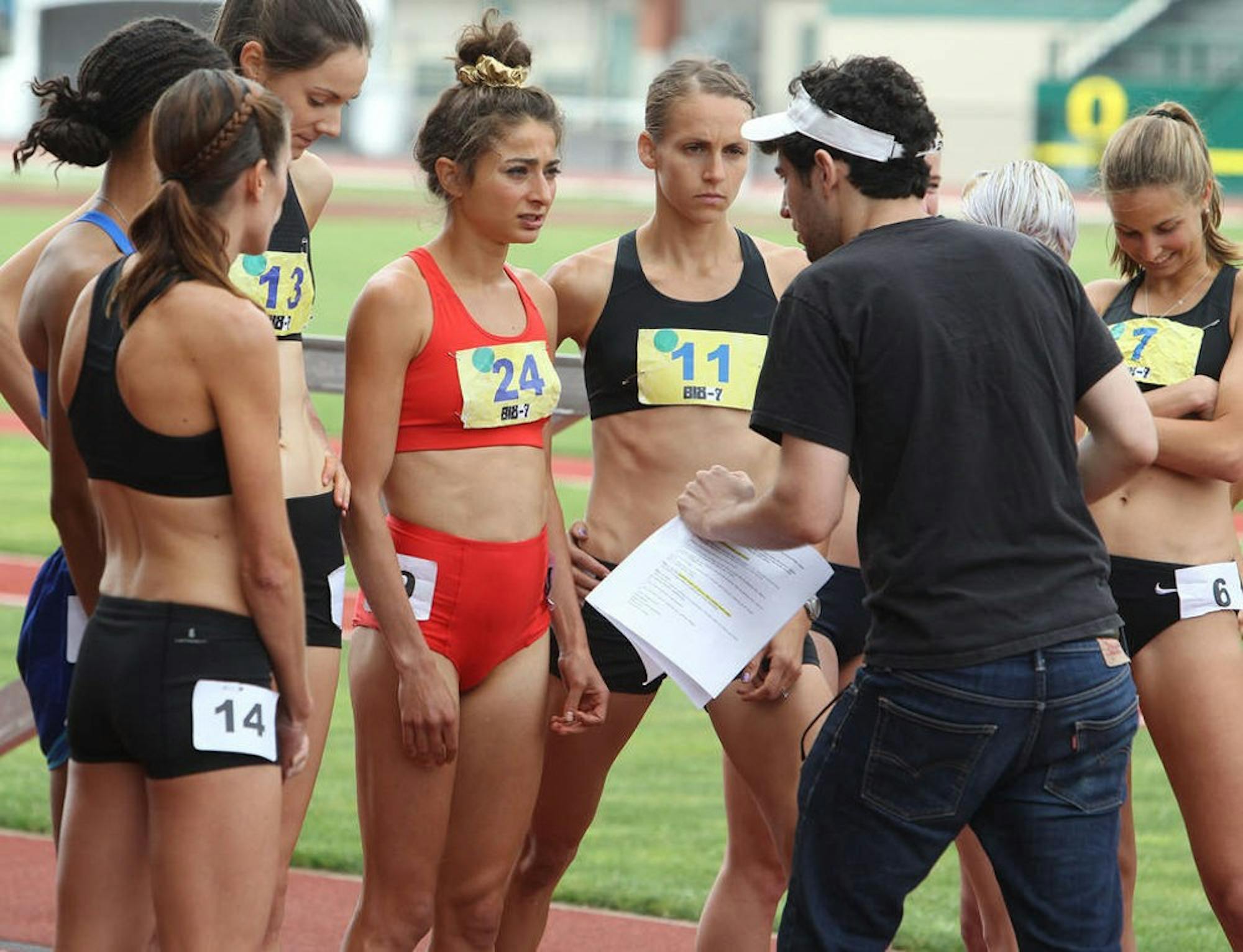When Plumb Marigold, fictional Olympic hopeful and the protagonist of the just-released indie film “Tracktown,” laces up her shoes to run, the world watches. People stare. They whisper.
Alexi Pappas ’12, the real-life Olympic runner who plays Marigold, has made a name for herself as well — first in the running community and now in the film industry.
In the film, Marigold is a famous distance runner preparing for the Olympic Trials. An injury in the 5,000-meter preliminary forces her famous but lonely character to take a day off, and she lives out the coming-of-age experience that running never allowed her. In the span of 24 hours, she gets together with a crush, fights with her best friend and reconciles with her parents. The earnest story that “Tracktown” tells aims to capture the experience of an elite female runner.
“The idea for the movie came from my experience living and moving to Eugene, Oregon, which I first experienced when I ran in the Olympic Trials in 2012 and found this place that embraced the running world unlike any place I’d seen before,” Pappas wrote in an email statement. “The story is a patchwork collage of my experiences as a runner in Eugene and my observations of other runners I have met and interacted with.”
“Tracktown”’s spirit is wedded to its setting in Eugene. If Eugene has a holy place in the Unites States track and field — having hosted multiple Olympic Trials, produced world records and given the world Nike — then Hayward Field is its cathedral. The stadium, which was the venue for Marigold’s Olympic Trials in “Tracktown,” is named for Bill Hayward, who helmed the University of Oregon track and field team from 1904 to 1947.
As an Olympic competitor and member of Oregon Track Club Elite, Pappas had access to the people and places, like Hayward Field, to shoot an authentic movie.
“This process was special because the access that we had to the Olympic running world — being able to shoot in these Olympic training facilities — that’s not really something you can pay for, we got access to that because [Pappas] was actually an Olympic athlete,” said Jeremy Teicher ’10, Pappas’ fiancé and co-director.
Teicher and Pappas wove bits of their own experiences into the story of the film.
“They’re based on experiences and observations, so any of the characters could be real,” Teicher said.
“Tracktown” explores, among other things, the way an elite runner relates to her body. At times in the film, Marigold frets that her muscular physique is unattractive and worries that she hasn’t menstruated for two years.
“My hope with ‘Tracktown’ was to show these bodies as they actually are, to come from a place of truth and open the audience to a world — and people — that they may not have seen before,” Pappas said.
Teicher and Pappas knew that their film would be seen by Pappas’ peers in the elite running community, and they wanted Tracktown to be as honest a portrayal as possible.
“Our philosophy in making this movie is to tell a story that opens a window onto a world in an honest way that people haven’t seen before,” Teicher said. “The goal is for someone to watch the movie and walk away with an actual understanding of what the Olympic hopeful experience is like for a female elite athlete, and it’s importance that it come across as true — not overdramatized or oversimplified, just true.”
The film’s Dartmouth roots are also apparent if you know where to look. Pappas and Teicher met at Dartmouth through Bones Gate fraternity. Actress Rachel Dratch ’88, introduced to Teicher and Pappas through a Dartmouth acquaintance, plays Marigold’s mother in the film. Their first executive producer was Cassie Siegel ’12, and at the end of the film, Marigold and her dad fall asleep to a race of “Abbey ‘the destroyer’ D’Agostino [’14],” — as announcer Chris Berman calls her.
Pappas observed parallels between running and filmmaking, both skills that can be practiced and developed.
“Both have so much more work behind the scenes than expected,” Pappas said. “I believe that in both running and filmmaking, if we show up every day, we can accomplish our goals.”
To her fans, Pappas isn’t just a top athlete, the Dartmouth record holder in the steeplechase (9:55.89) and the Greek national record holder in the 10,000-meter run (31:36). Among aspiring competitive runners, especially teenage girls, she’s better known for what she does off the track. She writes essays about her experience as a runner and has a monthly poetry column for Women’s Running. With Teicher, she co-wrote the screenplay for “Tall as the Baobab Tree,” about a clash of generational values in a Senegalese village. In their Dartmouth days, the two also co-wrote a play for Wired, the 24-hour one-act play festival.
Among her fans, Pappas is perhaps beloved most for her quirky, ebullient, motivational presence on social media. A fan tweeted at her this week, “I got to run with an Olympian this morning!!” and Pappas responded “I got to run with YOU!!!” A Kentucky high school cross country runner sent her a photo of her team wearing the signature “Alexi bun” — a messy ’do which has become Pappas’ trademark — and Pappas replied “pack of buns / I see you / will go far.”
The mindset of a poet, essayist, improvisation actor, filmmaker and Olympian is one that keeps looking forward.
“Good thing I didn’t accomplish all my goals yet,” reads a tweet pinned to the top of Pappas’ feed, “because then what would I do tomorrow?”




